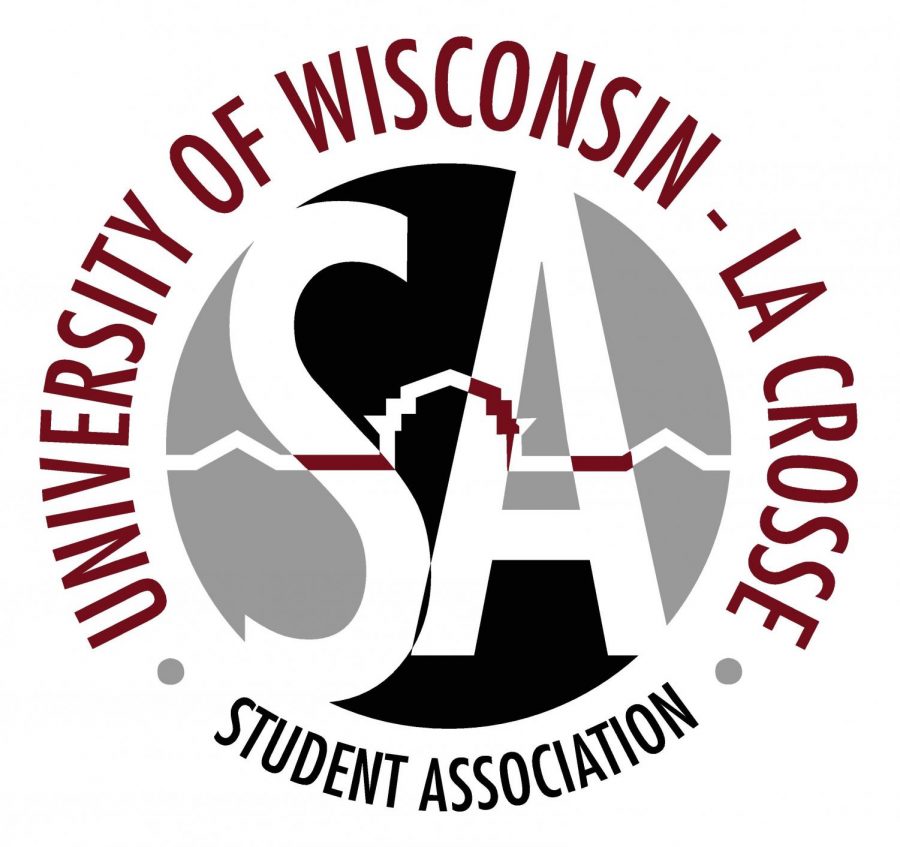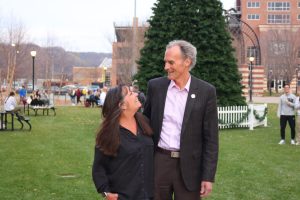Student Association discuss the green fund grants and student organization bylaw changes
May 3, 2020
On Wednesday, April 29, Student Association (SA) met virtually to discuss potential general education program changes, green fund grants, and student organization bylaw changes.
Anne Galbraith an associate professor in the biology department opened the meeting by discussing changes to the general education program. Galbraith has been involved with general education reform within four times of her career and says the current changes are “the farthest they have ever come.”
Future changes could include eliminating the math requirements and requiring a quantitive reasoning course option. Or, students could decide to take a traditional math requirement if applicable. A general education requirement at the University of Wisconsin-La Crosse that many students do not look forward to is HPR/HED; a modern “gym class.” This could be replaced with a “mind and body” category and offer more than three classes to fulfill the requirement.
Galbraith explained that she wants all UWL students to have a global component to their undergraduate coursework. This could be fulfilled by taking a language class, international business, study abroad, etc. In a survey of UWL students, 40 percent said that they have studied abroad or done some sort of international work such as an international business minor, a language course, or a language major or minor. The implementation of these changes and more will take at minimum, two years. This includes time for these changes to be approved and tested by departments. The current general education requirements equal to 48 credits, or roughly 1.5 semesters.
President Sita Agterberg explained that books from the Murphy Library may still be dropped off in their outdoor return box. For textbooks, she said UWL is exploring the option of a curbside drop off but nothing has been confirmed.
Agterberg said that the state government has issued a 5 percent lapse for the UW system, meaning that UWL must return $2 million over next year, where there will also be a second 5 percent lapse introduced and $2 million dollars will have to be returned again. The year after that, the UW system will be exploring a base budget reduction.
Unfinished business from the last meeting included SA1920-055: Resolution Approving Legislative Affairs Committee Bylaws Changes and SA1920-056: Resolution in Support of Student Representatives Restructurem, which were both called to question and approved.
Mitch Bunting and Sen. Andrew Ericson presented on the green fund grants. Bunting explained the difference between high priority and medium priority projects: “High priority is impact on carbon footprint, visibility, innovation, sustained impact on the student population at UW-La Crosse, and educational value. Medium priority is the size of the project, ability to demonstrate a quantifiable economic return, interdisciplinary, etc,” he said.
The first green fund grant project discussed was the “OZZI” system. It is a $25,348 request that would be implemented this fall, and hopefully, end the use of to-go containers by the spring of 2021. Each box will be 50 cents and the system will eliminate the waste. Students, faculty, or staff member will go to the information center, they have to pay $4 to get tokens. Once the user has the token, they will present it to the cashier then they will get the meal in the OZZI container. When they’re done, they will return it to the Union and place the OZZI box inside of a machine, which will be across from the Union. That box will be scanned and then they will get their box back. The containers will go in the OZZI machine, once that’s full they will take them to be washed then they can be washed by another student.
This is all still pending information until the grant is approved. The second green fund grant up for approval is the green energy surcharge which would be $14,937 for FY21 and $29,874 for FY22.
The third grant awaiting approval is “steam traps,” which would be in Laux Hall. This would be uploading the previous water-saving technology as faulty steam traps can lose up to 20 percent of water. Residence life would pay $15,ooo for just the steam traps themselves.
Next, is the stadium veteran lights which passed last semester. But, extra costs for the “aesthetic” of the lights will be $15,000-$25,000. If this is not approved, the grant will be canceled and the money that was approved would go back in the green fund account. If this is not approved, an extra $55,000 would go back into the green fund.
Sen. K.C. Cayo said they were not comfortable with the green energy surcharge being a two-year plan. “We have no idea what the hit from COVID will look like. We only really feel comfortable with a one-year plan. This isn’t necessarily a SUFAC endorsement, but more needing opinion. We approved grant money for the first year and not the second,” said Cayo.
Agterberg explained her thoughts: “I have a lot of thoughts on this. I don’t believe that, in general, we should spend money on this because it is something the University should be putting things like this in their budget. Because of COVID-19 it changes things and creates new budget cuts. It’s not that much money, I think it should be for both years because there will be a $2 million budget cut this year and next year, and then a base budget cut. This can be quick and easy and is small. I’m very conflicted.”
Agterberg continued, by voicing her concerns about the green fund being discontinued. “I do want to state that the university will be in trouble for more than one year. If we do go online in the fall, the green fund could be something that’s cut. If students keep complaining about getting seg fees refunded. There could be a chance we don’t have a green fund anymore. It’s something to think about,” she said.
Vice President Dana Nielsen said that as of now, segregated fees will not be refunded to students. For the OZZI containers, senators discussed the $4 charge and how this could impact low-income students.
Evelynn Yuengst said, “I’m thinking about our low-income students or those who can’t afford $4. That’s still something that worries me. Either if we could waive the fee or apply for it to be waived or something.” The discussion was on the OZZI containers will continue next week when the vote on all green fund grants will be held.
Next, the steam traps were discussed. Sen. Cayo said, “I don’t like that green fund keeps being tapped into for maintenance. That’s something the University can invest in. Also, they weren’t doing it before. That’s the thing that made us uncomfortable. They very well may not replace it if we do not do it for them. Again, we wanted senate to see it and give their input.”
Yuengst said she is worried about residence life being able to afford new steam traps because of their recent refunds of housing due to COVID-19. Sen. Ericson is in favor of the grant and said, “I do think that green fund money should not be used to help maintenance buy what they need to buy if it’s an improvement in our carbon footprint though I’m okay with it.”
The stadium veteran lights grant was approved last semester, but now there is an additional charge of $15-$20,000 for poles and light fixtures. Sen. Ericson shared that he is not a “fan” of the grant and does not think it should be passed. “If you compare it to the other LED projects. We paid $15,000 in the REC and are saving 53,800 KWH of savings. The stadium veteran walkway would be paying the most and saving the least KWH. I don’t think we should buy poles with green fund money.”
Sen. Hansen echoed, “When we originally passed this last semester, the poles weren’t the question. I think its kind of gross and insulting that they’ll only do it if it fits the aesthetic, but we wanted the environmental benefits. We paid for the lights, not the new poles.”
The green fund grants will be voted on at next week’s meeting.
Next, the SA1920-061: Resolution to Amend Student Senate Bylaws was discussed. This resolution has been lead by sustainability director Sam Wolfe and Sen. Dylan Schock, and it would make changes to the vacant senate seat that would opt to a rotating seat where different student organizations can apply to have a senate seat for the academic year, giving further representation to student organizations and alter the SA bylaws as well. Previously, the green fund committee was an ADHOC, but now it could be a permanent committee seat.
A second resolution, SA1920-064: Resolution Approving Changes to Student Organizations Committee Bylaws was also led by Schock.
He said, “This was written to update the student org bylaws. That’s why this has the exact same information, but it’s reflected within student org committee bylaws. Also, the committee is finalizing some things. This might be added to. It might have to do with inclusivity. That’s why we want to start the conversation now.”
SA1920-061 and SA1920-064 will be voted on next week. Sen. Jessica Boerschinger was elected as “Senator of the Month” and the meeting was adjourned.







